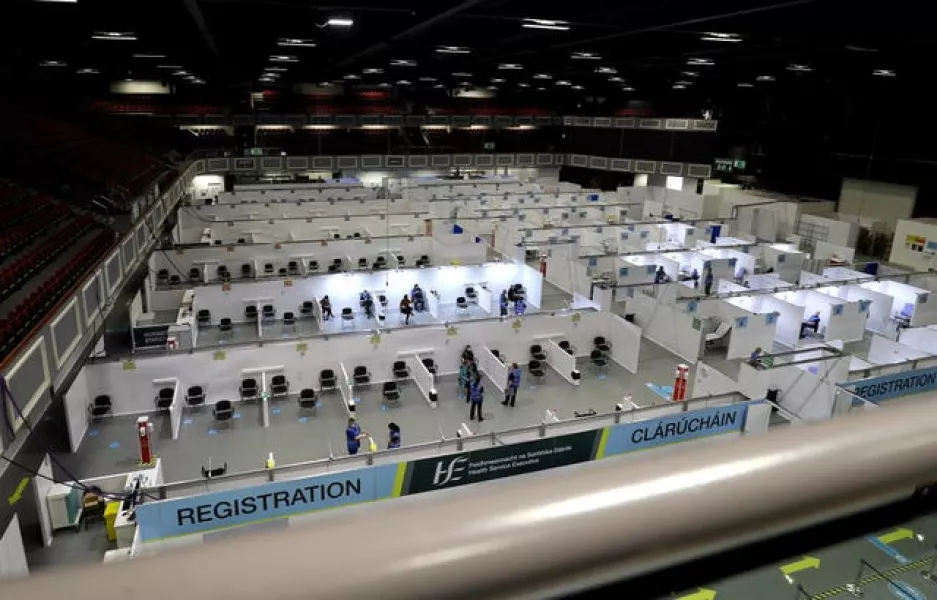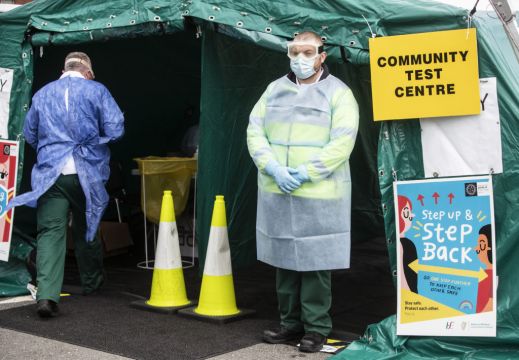A slight rise of Covid-19 cases reported in children is due to an increase in testing and not the reopening of schools, a senior health expert has said.
Professor Philip Nolan, chairman of the Irish Epidemiological Modelling Advisory Group, said that data shows schools remain a low-risk environment.
Prof Nolan said that a public health investigation looked at incidence of coronavirus infection in children in recent weeks, to assess the impact of the phased return of schoolchildren to the classroom.
He said that schools are low risk because of the mitigation and protection measures put in place by teachers, principals, families, general practitioners and public health doctors.
We have looked carefully at incidence of SARS-CoV-2 infection in children in recent weeks for any impact of the phased return to the classroom. The data, and thorough public health investigation, confirm that schools remain a low-risk environment. 1/16 pic.twitter.com/E0IMAc5EI8
Advertisement— Professor Philip Nolan (@PhilipNolan_SFI) April 9, 2021
Schools will reopen to all students on Monday, marking the final phase of the Government’s plan to have all pupils back in the classroom.
First to fourth year secondary school students will return to school for the first time since the Christmas holidays.
Health experts have been assessing the rate of Covid-19 cases detected in schools, as well as any wider impact of the increased movement of people.
Prof Nolan tweeted: “The data show a moderate and transient increase in cases of SARS-CoV-2 infection reported in children, not directly because of the return to in-person education, but due to increased detection, or case ascertainment, related to an increase in testing.
“During a surge, incidence in children is generally lower than the population average, but towards the end of the surge it converges with the population average.
“There have been two recent increases in incidence in children, in early February and mid-March.
If you have any COVID-19 symptoms, don’t mix with others and self-isolate immediately. Call your GP or GP out-of-hours service as soon as possible to arrange a free COVID-19 consultation. Your COVID-19 test is also free. #HoldFirm #StaySafe pic.twitter.com/teGJpqTgr8
— HSE Ireland (@HSELive) April 8, 2021
Advertisement
“Specifically, during a surge, we first see incidence rising in 19-24 year olds, later and simultaneously in adults 25-64 year olds and teenagers, and later again in children, slowly converging on the population average towards the end of the surge.
“So what explains the recent changes in incidence in children? The first increase occurred in early February, just after we resumed testing of asymptomatic close contacts, which had been paused for most of January.”
He said that children are more likely to be asymptomatic and the number of asymptomatic infections detected in children dropped sharply in January.
The resumption of close contact testing in February led to an increase in incidence.
The second increase in incidence rate happened in March, shortly after the first phase of reopening schools.

“While the level of testing increased 5 to 10 fold, the increase in detected infections was much smaller (40-50%), suggesting that the increase in incidence is in significant part due to the increase in testing,” he added.
“We note also that school opening is associated with an increase in attendance at workplaces; this increase in social mixing amongst adults carries a risk of increased viral transmission between households.”
Meanwhile, Minister for Transport Eamon Ryan said the Government will meet next week to consider adding EU countries, including France and Germany, to its mandatory quarantine list.
The issue of including European countries has caused division among Government ministers, however the Cabinet is expected to sign off on the new additions.
#COVID19 cases in Ireland infographic. Containing graphs such as number and cumulative number of confirmed COVID-19 cases notified in Ireland by notification date. Published daily https://t.co/oJMNO6cJ8h pic.twitter.com/o45Vdva1fz
— HSE Health Protection Surveillance Centre (HPSC) (@hpscireland) April 9, 2021
“The Government is meeting next week to consider the advice of health authorities, who are saying we should be looking at countries like France and Germany, and including them in our quarantine list because of the very high incidence and concern about variants in those countries,” Mr Ryan told RTE.
“That is not going to give us complete security, we still have a border with Northern Ireland, where we will not be able to seal it fully.
“It does give the potential to reduce the risk and protect this country in this critical next two months as we get our vaccination programme rolled out.
“It’s not going to be a permanent fixture, we have to have an exit strategy as well as an entry strategy.
“The logistics are very difficult, it is a real imposition and hardship and a lot of people – no-one wants to be joining it – but the Government’s sense is that we are correct to follow health advice in these circumstances.
“Particularly in the coming five to six, seven, eight weeks when we’ve critical period to get our people vaccinated, to reduce the risks, and in those circumstances, yes, but it’s not permanent.”







